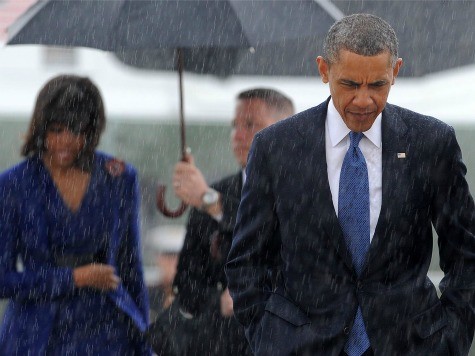
On Thursday, the federal government reopened, ending the partial government shutdown. The Treasury has new borrowing authority to continue its deficit spending. The House and the Senate reached agreement to convene a conference committee to discuss longer-term budget issues. The media will herald this as a win for Obama, but it is more like a reprieve. The deal agreed to late Wednesday simply preserves the budget status quo for a handful of months.
The debt ceiling, for the first time, was raised for a period of time, rather than a specific dollar amount. The current sequester cuts were preserved in the government funding bill. The Obama Administration will have to take additional steps to verify income eligibility for people claiming ObamaCare subsidies, a provision which was already law.
The Republicans failed to win any changes to ObamaCare, but political math always made that a gamble. They blocked, however, any new spending or tax increases. If ObamaCare had not been the main focus of negotiations, Democrats would certainly have pushed for more spending in the funding bill.
In the budget conference committee set to begin talks, the Democrats will certainly renew their push for more federal spending. The sequester requires even deeper cuts to spending next year.
The fiscal drama that unfolded over the last three weeks provided four important take-aways:
1. The Government Really Is Bloated. The government went through a partial government shutdown and furloughed 800k workers and the public barely noticed. The only signs the government was shutdown were willful acts by the Administration to inflict pain on the public for the shutdown. Do we really need federal funds to keep the ocean or public monuments open to the public? Democrats and the media always warn about the harmful effects of any reduction in federal spending. Except for rare anecdotes, these warnings never materialize. Clearly, there is a lot of bureaucratic fat that can be trimmed.
2. Harry Reid Is the Titular Leader of the Democrat Party. In the coming days, the media will congratulate Obama for his “win” on securing a temporary reprieve on spending. Actually, it was Senate Majority Leader Harry Reid who drove the Democrats’ strategy. Obama was largely a bystander to the stand-off, both refusing to negotiate or teasing possible compromise. Reid forced VP Joe Biden into exile for the talks and Senate Democrats openly criticized the President when they thought he was giving ground. Even if it turns out Obama had a larger role behind the scenes, his “win” was simply securing the existing budget guidelines.
3. Conservative Grass Roots Are Reenergized. The fiscal fight was driven largely by renewed cooperation between conservative lawmakers and the grass-roots. Few in Washington, including many conservatives, relished the fight in the manner it evolved. They were driven to it by concerted outreach from grass roots activists. These ties had weakened during the 2012 campaign, when establishment Republicans took over the GOP campaigns. A number of grass roots leaders have told Breitbart News that this latest stand-off is just the first of many battles in the long fight to get the federal budget on a sustainable path. The fight picks up again, after all, in just three months.
4. GOP Quislings Self-Identified Themselves. Democrats and the media described conservatives who wanted changes to ObamaCare as “terrorists.” Many Republicans in DC used only slightly less colorful language to attack their colleagues. Conservatives who wanted changes to ObamaCare were forced to fight a two-front war; one against the media and another against fellow Republicans, like Sens. McCain and Corker, who rarely missed an opportunity to trash their caucus members in the media. Republican activists now have a handy guide to those Republicans who want to appease and those who will fight for liberty.
Conservatives didn’t win their policy goals, but they live to fight another day. When US Grant took over Union forces and launched the Overland campaign in Virginia, he lost his first engagements. After his first loss, he stunned his aides by ordering his army to continue its march south. Past Union generals had retreated to salve their wounds. It was the beginning of total, modern warfare. Within a year, Grant would prevail and the war would come to an end.
Conservatives, today, march on.

COMMENTS
Please let us know if you're having issues with commenting.